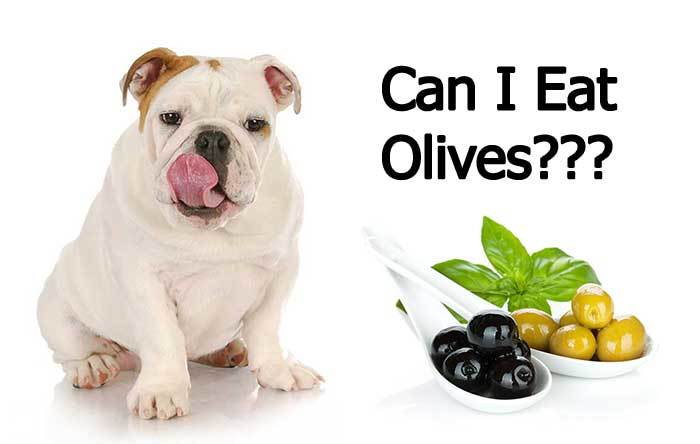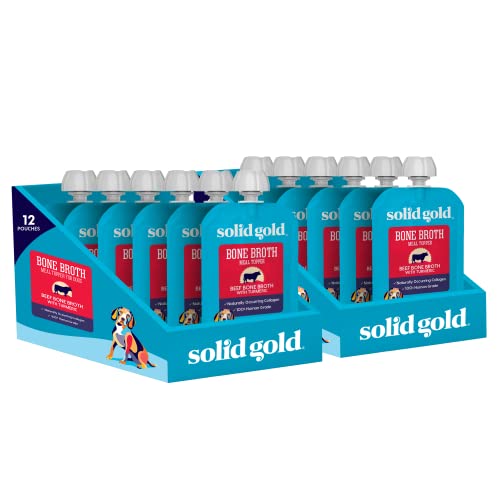Olives are fruits that grow on the olive tree. The tree, scientifically known as Olea europaea, is almost native to the Mediterranean region; from Portugal to the Arabian Peninsula.
As a fruit, you can eat olives right from the tree. However, the fruit contains compounds like phenolic and oleuropein that make it taste bitter. To make the fruit more palatable, you may have to remove or reduce the effects of these compounds.
Besides eating it raw, you can also add olives into sandwiches, tapenades, or salads.
Additionally, the fruit contains a highly-nutritious oil. The oil is often extracted and processed into dietary supplements.
Olive oil is also used for external applications due to its skin moisturizing and rejuvenating effects.
With all these potential benefits, can dogs eat olives?
Like many other fruits, olives aren’t toxic to dogs. Therefore, your pooch can comfortably snack on this fruit. But as we shall find out, it all comes down to moderation.
Read on for a more insightful view on the topic.
What Are The Available Forms Of Olives?
Olives exist in two possible forms, namely; black and green olives. The difference between black and green olives lies in the time they’re harvested.
Though these two variations are both derived from the same tree, green olives are often harvested earlier than their black counterparts.
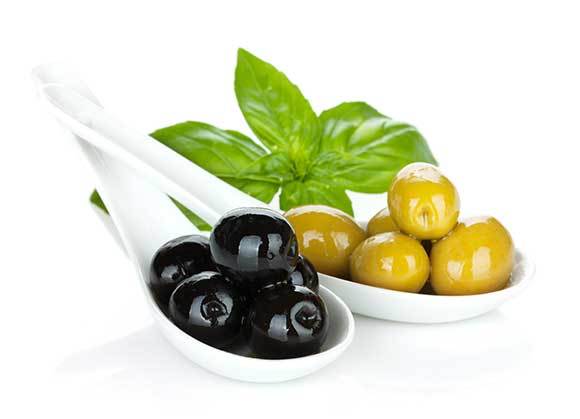
So, you may have been wondering to yourself, can dogs eat green olives? What about black olives, can dogs eat black olives?
As we have mentioned, there are no fundamental distinctions between black and green olives apart from the difference in harvest time. Therefore, your dog can have both black and green olives. If there are precautions and caveats, they apply to both variations.
Perhaps, the only other difference between green and black olives would be the fat content in them.
For example, a half-cup of black olives boasts 7 grams of fat as well as 4 grams of carbs. The protein content is negligible, at only 1 gram.
On the other hand, the fat content in green olives is slightly higher, with half a cup containing up to 11 grams of fats. The same half a cup contains 3 grams of carbs, which is somewhat lower than that in black olives. However, the number of proteins remains the same, at 1 gram.
- SUPERFOOD INGREDIENTS – This dog bone broth is crafted with carrots, sweet potatoes, apples, pumpkin, and ginger to help promote gut health and…
- SLOW-SIMMERED BONE BROTH – Your pup will love the rich aroma and taste of this slow-simmered bone broth that promotes healthy hydration and provide…
- NATURALLY OCCURRING COLLAGEN – Rich in natural collagen from beef bones, collagen is an essential protein that promotes healthy skin and nails while…
Last update on 2025-01-13 / Affiliate links / Images from Amazon Product Advertising API
Now, it may appear like the fat content in green olives is significantly higher than that in black leaves. However, 7-gram fat content in half a cup of any food is already quite high by any standard of measure.
So, if you were to choose either of the two variations depending on the amount of fat each fruit contains, there wouldn’t be any significant difference.
However, both the black and the green olives contain an abundance of vitamin E which comes with a host of health benefits.
The fruit also tends to be high in sodium. As we shall find, that may make it an unwelcome treat for your canine friend.
But in terms of nutritional benefits, we’ve only scratched the surface. So, you might still be wondering; is olive oil good for dogs? The following section shall highlight some common health benefits of olive.
Health Benefits of Olive
The question “are olives good for dogs?” can be answered by understanding the possible health benefits of this fruit. In this section, we will focus both on the fruit as well as the oil.
The following are some of the benefits of olive;
1. Prevention of Disease
Olives are rich in antioxidants. These antioxidants fight free radicals that are associated with aging problems and multiple risks of disease.
A snack of olives, be it the raw fruit or olive oil, might help keep certain illnesses at bay. Examples include heart attacks, strokes, and cancers.
In fact, olive oil has been cited as one of the most effective foods in fighting cancerous cells.
In addition to boosting your dog’s immunity, the antioxidant properties of olive oil can also prevent premature aging. Premature aging is a common problem among large and slothful dogs.
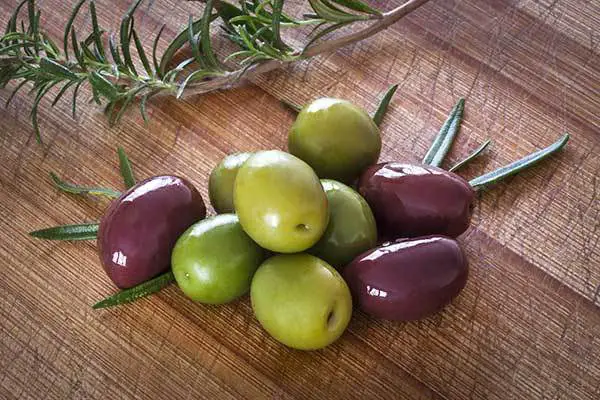
2. Great for Weight Management
Obesity in dogs is a risk factor for a host of other conditions such as diabetes and heart attacks. So, can diabetic dogs eat olives?
They sure can. Olive can help keep your dog’s weight within healthy and manageable levels.
One fruit contains about seven calories. And the best part is, the fruit has a “negative calorie load.” This implies that when you offer it to your pooch, he will burn more calories digesting the fruit, as opposed to gaining calories.
ALSO READ: The Best Organic Dog Treats For Your Furry Friend
3. High in Good Fats
We already highlighted the fat content in both the green and the black olive fruits. It’s important to note that these are typically mono-unsaturated fats.
Therefore, they aren’t fattening. Instead, they improve good cholesterol, which ultimately lowers the risks of hypertension and heart disease.
4. Retentive Memory
Olives contain compounds that have been shown to reduce oxidative stress, especially in the brain. One such compound is polyphenols. Therefore, the fruit could have immense brain development benefits for dogs.
If you realize that your dog is having problems memorizing commands taught from just a few days ago, then perhaps he needs a memory boost. A serving of olive fruit or olive oil would do the trick here.
- GUT HEALTH SUPPORT: Boost your dog’s digestive health with 90 million probiotics per pound in our dry dog food for large dogs, promoting balanced gut…
- IMMUNE SYSTEM BOOST: Rich antioxidants, vitamins, and omega fatty acids from salmon oil fortify this large breed dog food and promote a strong immune…
- NATURAL INGREDIENTS: Crafted with lamb and rice and potato-free whole grains, our premium formula offers essential nutrients, making it a healthy dog…
Last update on 2025-01-10 / Affiliate links / Images from Amazon Product Advertising API
5. Controlling Appetite
One way to prevent your dog from becoming obese is by checking the quantity of food he eats.
Olive contains monounsaturated fatty acids, which are known to lower the rate of digestion.
Therefore, your pooch will eat less but feel fuller for longer. That is essential in curbing the dog’s appetite and food cravings.
Besides, monounsaturated fatty acids can stimulate cholecystokinin, a hormone that sends fullness signals to the brain.
6. Pain Relief
Olive oil is rich in the compound oleocanthal. Due to its high anti-inflammatory properties, oleocanthal can act as a natural analgesic. This could play a significant role in relieving pains that result from physical injuries and muscle sprains.
These natural analgesic effects might also come in handy for dogs undergoing chemotherapy sessions.
Also, dogs recovering from surgical operations can benefit immensely from the pain-relieving benefits of olive oil.
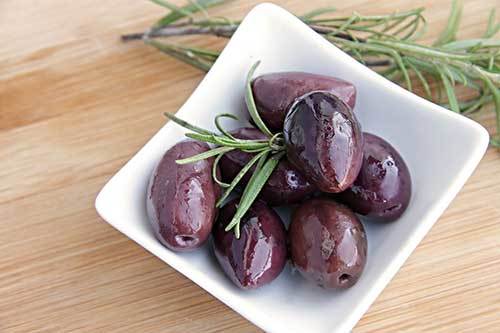
7. Relieving Constipation
Last but not least, olive fruit is rich in dietary fiber. Our dogs suffer from constipation from time to time.
Constipation progressively worsens as the dog loses its appetite. Thankfully, there are numerous effective home remedies for constipation. And olive is one of those.
So, can dogs eat olive oil for constipation? Yes, a little olive oil is all it takes to cure constipation and bowel incontinence in canines. Even better, studies have shown that olive oil can kill harmful bacteria such as Helicobacter pylori. This bacteria is associated with abdominal discomfort and even gastric cancers.
According to research, virgin olive oil can effectively fight up to 8 strains of Helicobacter pylori in humans, including three that are resistant to antibiotics. The same is likely true for dogs too.
There are many other benefits of olive fruit and olive oil for dogs that we cannot exhaust them in one article. However, are olives safe for dogs?
The answer to that question depends on various parameters such as the amount and the form the fruit is offered.
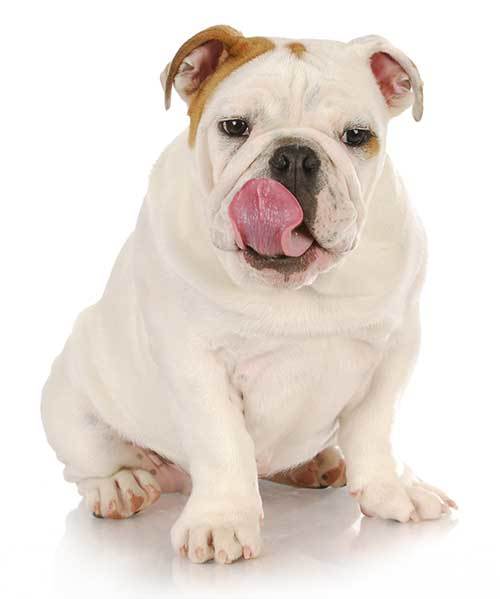
What Does a Dog’s Diet Consist Of?
It’s easy to imagine that dogs require human foods for their nutritional nourishment. Indeed, most pets wouldn’t mind feeding exclusively on human foods. However, not all human food is fit for them.
For example, dogs do not require fruits and veggies to survive. Being obligate carnivores, they can live entirely on a diet of meat and partly animal parts.
If we allowed our canines complete freedom on the foods to consume, they would prefer more fat, a little protein, and very few carbohydrates.
According to various studies, that works out as a ratio of 63%:30%:7% for fats, proteins, and carbohydrates, respectively.
So, unlike humans who derive a substantial amount of their energy from carbohydrates, dogs get their energy from fats. Having said that, can my dog have black olives?
We already discovered that olives are rich in fats. And the best part is, these are monounsaturated fats. They are not only a good source of energy for your pooch. Olive fats, which in most cases exist as oils, also improve your dog’s good cholesterol.
ALSO READ: Can Dogs Eat Cabbage? Is It Safe For Them?
Are Olives Poisonous To Dogs?
The short answer is, it all depends on the form administered.
When feeding your dog any food that’s not part of his staple diet, moderation is key.
When it comes to olive, you should administer the fruit in small doses while also keeping in mind that some parts might be toxic to your canine.
For starters, always remove the pit before offering the fruit to your dog. Olive pits are quite tough, and your canine may find it difficult to chew. Therefore, it could pose serious choking hazards. The risks of choking are higher for puppies and smaller dog breeds.
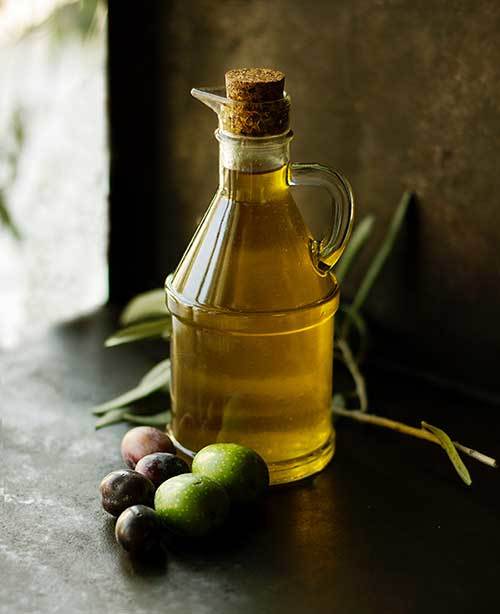
There is also the question of canned olives. As you may already know, most canned foods are high in salty brine. Along with food additives and other preservatives, brine is highly toxic to dogs.
Excessive salt intake could lead to sodium-induced dehydration as well as sodium poisoning. If not addressed with the urgency it deserves, sodium poisoning could damage your canine’s kidneys.
Excessive salt could also lead to a host of gastrointestinal side effects such as nausea, diarrhea, vomiting, and abdominal pains.
If you must offer your pooch canned olives, ensure you rinse it first. That will help eliminate brine, other preservatives, and even trans fats.
Apart from canned olives, there are also pickled olives. But, can dogs eat pickled olives?
Like canned olives, pickled olives are significantly high in salt, preservatives, and spices. Therefore, you should never offer pickled olives to your furry companion.
When it comes to black and green olives, both boast a significant amount of healthy fats. However, black olives are safer as they contain lower sodium content compared to green olives.
As a general precaution, ensure you clean the fruit first before offering it to your dog.
- 10 Benefits in 1 Daily Treat – PetHonesty’s 10-For-1 Multivitamin chews combine a well-rounded blend of the most essential vitamins and supplements…
- Joint Health with Glucosamine – These natural supplement soft chews have high amounts of glucosamine and other joint support ingredients that reduce…
- Improve Digestion with 1 Billion CFU Probiotics – These one a day dog vitamins contain probiotics and pumpkin, which help keep your dog’s digestive…
Last update on 2024-12-21 / Affiliate links / Images from Amazon Product Advertising API
You’re also likely to bump into stuffed olives. Generally, stuffed olives contain jalapenos, feta cheese, pimentos, anchovies, and blue cheese. Some of these ingredients may be safe for your dog, while others could be potentially toxic.
The conventional wisdom is to study the ingredients list carefully, and ensure it’s free of poisonous substances. Remember that even if 4 out of 5 ingredients in stuffed olives are safe, the food may still be considered unsafe for dogs.
Lastly, you may be torn between feeding your dog olive fruit or olive oil. You might be wondering, is olive oil healthy for dogs, or do I just give my canine olive fruit?
Both the fruit and oil are great for your pooch. However, olive oil is more preferable. First, the oil takes less time to digest, hence is absorbed into the body almost immediately. Secondly, it’s easier to measure accurate portions when offering your dog olive oil as opposed to the fruit.
The best part is, olive oil comes with extra nutritional and health benefits over and above what your canine gets from olive fruits. Plus, you can administer the oil in several ways. And that may lead to the question, can dogs eat olive oil in their food?
Yes, you can add olive oil to your dog’s food. However, remember that not all olive oil is meant for internal consumption. Some oils are prescribed explicitly for external application, especially in terms of making your dog’s skin shinier and glossier.
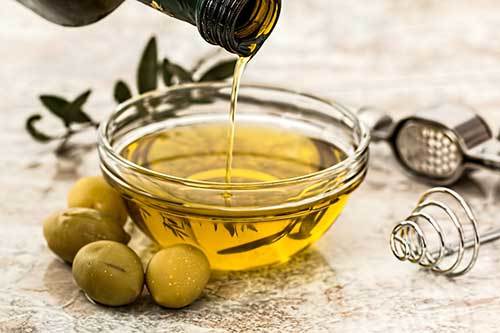
Can Olives Kill Dogs?
There are no documented fatalities so far. However, olive can kill dogs depending on the amount and form you feed the dog. Your best bet is to feed your dog plain olives that contain no additives.
For all canned and jarred olives, ensure you rinse out the salt and other preservatives.
If your canine sneaks up behind your back and helps himself to vast amounts of olives, especially salted olives, you should understand the signs to look out for.
Some common signs of salt poisoning include;
- Disorientation and confusion,
- Frequent and intense thirst sensation,
- Vomiting and diarrhea,
- Seizures,
- Coma [and possibly eventual death].
Salt poisoning may be too severe to treat using home remedies. If you notice any of the above symptoms, rush your pet to the vet immediately.
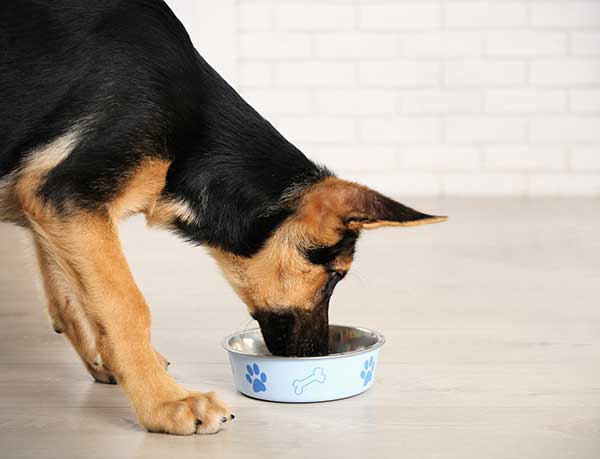
So, Are Olives Bad For Dogs?
Not really. Dogs can eat olives comfortably, and you need not be worried. But as we’ve repeated severally, only offer your dog plain olives. Avoid anything salted, spiced or laden with preservatives. Remember that one fruit of olives contain up to 60 mg of sodium.
Thankfully, you can reduce the salt concentration in this fruit through osmosis. Just place the fruit in plain, distilled water and let osmosis do the rest.
Checkout Our Favorite Dog Products
1. BEST PUPPY TOY
We Like: Snuggle Behavior Toy with Heart Beat & Heat Pack – Ideal toy for new puppies.
2. BEST DOG TRAINING PROGRAM
We Like: Doggy Dan The Online Dog Trainer – Stop any dog problem and raise the perfect puppy with The Online Dog Trainer.
3. BEST DOG DNA TEST
We Like: Embark Dog DNA Test – Embark screens for over 250 dog breeds + tests for 170+ genetic diseases including MDR1 drug sensitivity, glaucoma, degenerative myelopathy, and dilated cardiomyopathy, some of the most common adult-onset diseases in dogs.
4. BEST DOG PUZZLE TOY
We Like: Outward Hound Interactive Puzzle Toy – Every dog loves chasing squirrels at the park. The Outward Hound Hide-a-Squirrel Puzzle Toy gives your dog the same feeling as though he was outdoors chasing live squirrels.
5. Best Calming Treats for Dogs
We Like: FurroLandia Hemp Calming Treats – These soft chews will calm your dog so it can peacefully endure stressful situations, such as long car trips, visiting unfamiliar places, or hearing Thunder. Ideal for all dog breeds & sizes.

